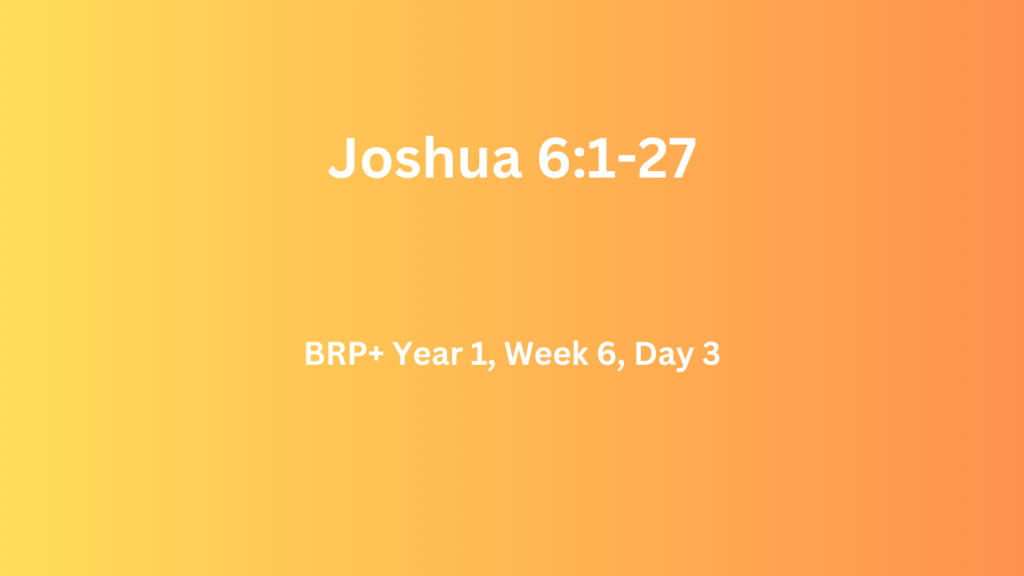Joshua 6:1-27
Q.1. What made Israel confident of destroying the mighty city of Jericho? What strategy was Joshua given for fighting? What part did the priests play? – (Josh.6:1-11)
The opposing nations were filled with fear, after hearing of Israel’s miraculous crossing of the Jordan River. The people of Jericho had locked themselves in the formidable walled city. The outer walls were two metres thick, with another inner wall that was four metres thick (Josh.6:1 c.f. 5:1). Israel was not fazed, because the Lord had promised Joshua victory in advance – … See I have given Jericho into your hand, with its king and the valiant warriors (Josh.6:2). The army was ready for conflict. However, they were given a strategy that tested their trust in God. They were commanded – You shall march around the city, all the men of war circling the city once. You shall do so for six days (Josh.6:3). As well as that – seven priests shall carry seven trumpets of rams’ horns before the ark; then on the seventh day you shall march around the city seven times, and the priests shall blow the trumpets (Josh.6:4). No invading army had ever employed such unusual tactics. There was an eerie silence apart from the sound of some six hundred thousand soldiers marching in step. NOTE: Moses had taken a census of the surviving generation after Israel’s wilderness journey, identifying – whoever is able to go to war in Israel (Num.26:2). The total of the twelve tribes – who were numbered of the sons of Israel was six hundred and one thousand, seven hundred and thirty (Num.26:51). This included the fighting men from the tribes east of the Jordan, who had agreed to help the other tribes conquer the Promised Land while Moses was still alive. There were – about forty thousand equipped for war (Josh.4:12-13 c.f. Num.32:20-24).
Q.2. What part did the soldiers and priests play in the conquest of Jericho? What special instructions did Joshua give on the seventh day? How comprehensive was the victory? – Josh.6:12-21)
The soldiers and priests had to implicitly obey. The priests blew their rams horns, and the army marched around Jericho seven times on the seventh day. At the command – the people shouted, and priests blew the trumpets; and when the people heard the sound of the trumpet, the people shouted with a great shout and the wall fell down flat, so that the people went up into the city, every man straight ahead, and they took the city (Josh.6:20). Before all that, Joshua had given important instructions to his troops – (i) The city shall be under the ban, it and all that is in it belongs to the Lord (ii) only Rahab the harlot and all who are with her in the house shall live, because she hid the messengers whom we sent (Josh.6:17 c.f. Josh.2:17-18). Everyone and everything was to be destroyed, except – all the silver and gold and articles of bronze and iron are holy to the Lord; they shall go into the treasury of the Lord (Josh.6:19). In keeping with the command – They utterly destroyed everything in the city, both man and woman, young and old, and ox and sheep and donkey, with the edge of the sword (Josh.6:21). Jericho was the first fruits of the conquest. The city, in its entirety, now belonged to God. The precious metals were to be placed into the treasury. To take anything under the ban would bring a curse on the nation (as they would discover soon enough). This victory was comprehensive and complete.
Q.3. Who was spared from destruction? What did they do with the precious metals? What curse was placed on Jericho? What made Joshua a great leader? – (Josh.6:22-27)
Not only Rahab, but all her family were saved – However, Rahab the harlot and her father’s household and all she had, Joshua spared; and she has lived in the midst of Israel to this day, for she hid the messengers whom Joshua sent to spy out Jericho (Josh.6:25). This confirms that God does not show favouritism. It demonstrates that anyone who hungers for the Lord will never be disappointed. The precious metals could be purified. They were stored in the treasury of the tabernacle of the Lord (Josh.6:24). To attempt to rebuild Jericho, would be at the expense of the oldest and youngest son of a person, because Joshua had placed a curse upon the city (Josh.6:26). This came to pass during the reign of King Ahab (1 Kgs.16:34). This staggering victory strengthened the reputation of Joshua, because the Lord was with him – and his fame was in all the land (Josh.6:27).

